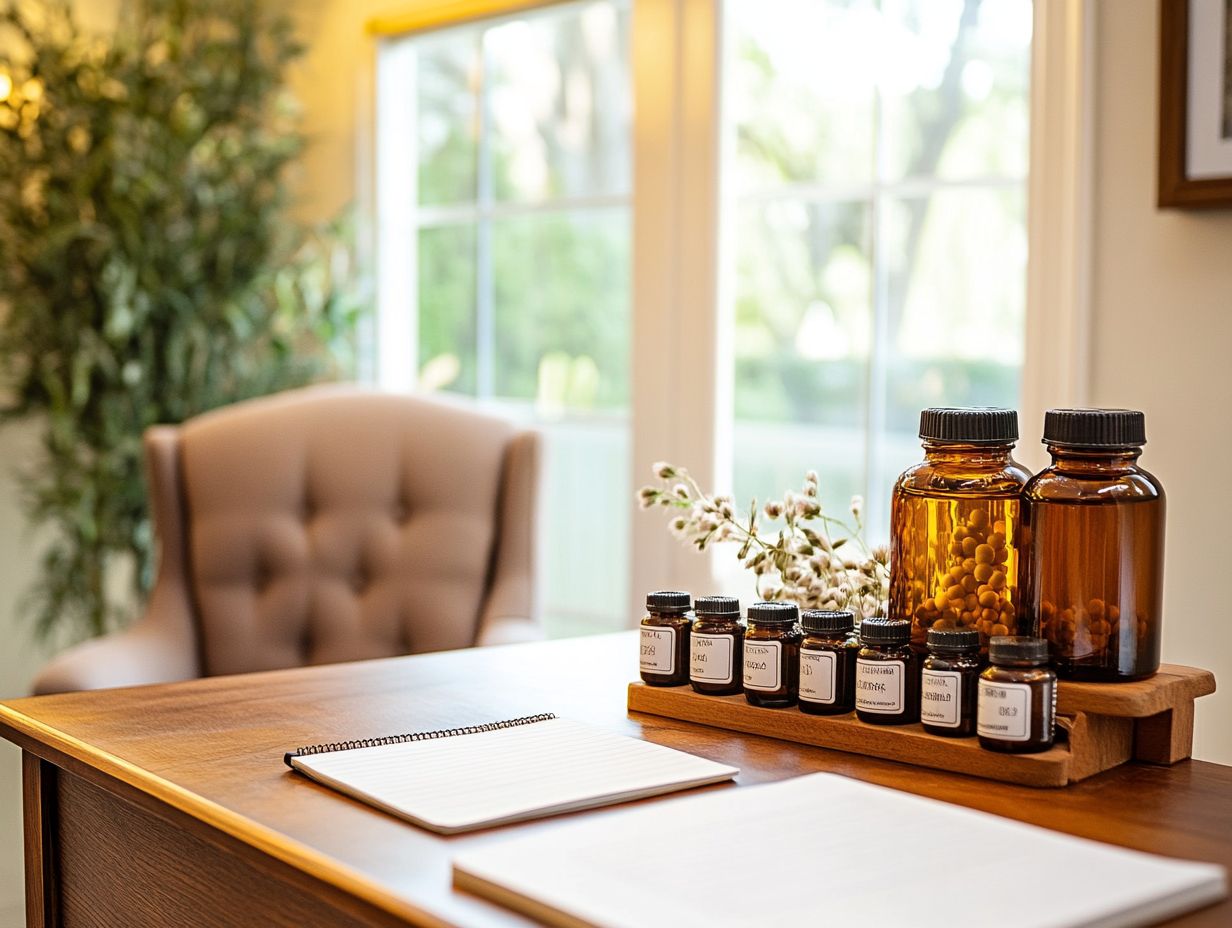The Art of Homeopathic Consultation
Homeopathy represents a whole-person approach to health care, highlighting the body’s remarkable ability to heal itself.
In this article, you will explore the fundamental principles of homeopathy, the qualifications required for practitioners, and what to expect during a consultation.
Discover how to prepare effectively, navigate the consultation process, and unlock the exciting benefits of homeopathic treatment.
Whether you are just starting your journey into homeopathy or seeking to deepen your understanding, this guide will help you discover the exciting benefits of homeopathy!
Contents
- Key Takeaways:
- Understanding Homeopathy
- The Role of a Homeopathic Practitioner
- Preparing for a Homeopathic Consultation
- The Consultation Process
- Benefits of Homeopathic Consultation
- Frequently Asked Questions
- 1. What is the art of homeopathic consultation?
- 2. How does the art of homeopathic consultation differ from conventional medicine?
- 3. What can I expect during a homeopathic consultation?
- 4. Is homeopathic consultation safe?
- 5. How long does it take to see results from homeopathic treatment?
- 6. Can I continue using conventional medicine while undergoing homeopathic treatment?
Key Takeaways:

Homeopathy is a whole-person approach to healing that focuses on individualized treatment based on the mind, body, and spirit.
Homeopathic practitioners are highly trained and use a thorough consultation process to gather information and create a personalized treatment plan.
A homeopathic consultation can lead to improved overall health and well-being by addressing the root causes of health issues instead of merely treating the symptoms.
Understanding Homeopathy
Understanding homeopathy invites you to explore its holistic approach to healing, which beautifully intertwines the mind and body.
This alternative medicine system champions the body’s natural healing capabilities, offering remedies for various conditions, including cardiovascular issues and neurodegenerative diseases like Alzheimer s and Parkinson s.
Practitioners like Bartosz Dziemidowicz provide homeopathic consultations, both in-person in the UK and online, ensuring diverse patient needs are met with care and accessibility.
What is Homeopathy?
Homeopathy presents a whole-person approach to healthcare that emphasizes treating you as an individual rather than just addressing disease symptoms.
This practice is rooted in the principle of “like cures like,” meaning that a substance causing symptoms in a healthy person can help alleviate similar symptoms in someone who is unwell.
The remedies, sourced from nature, undergo a careful process of dilution and shaking, designed to enhance their healing properties while minimizing side effects.
Homeopathy is gaining recognition for its potential in addressing a wide range of health conditions, from acute issues like colds and allergies to chronic ailments like asthma and arthritis.
This highlights the importance of creating personalized treatment plans that cater to your unique constitution.
Principles and Philosophy
The principles and philosophy of homeopathy are anchored in the belief that your body has an innate ability to heal itself, and that homeopathic remedies can effectively stimulate this natural healing process.
This approach connects key concepts like potentization, which involves diluting a remedy repeatedly to enhance its healing properties.
You might often hear practitioners reference the law of similars, which suggests that a substance causing symptoms in a healthy individual can treat similar symptoms in someone who is unwell.
Homeopathic treatment plans emphasize individualized care, recognizing that your unique constitution and lifestyle play a crucial role in the healing journey.
By incorporating lifestyle changes such as dietary adjustments and stress management you can instantly boost the effectiveness of your treatment, ensuring a holistic approach to your health and recovery.
The Role of a Homeopathic Practitioner
The role of a homeopathic practitioner is vital in guiding patients through their healing journeys. This demands a deep understanding of human physiology, diseases, and the wide array of homeopathic remedies available.
Qualified practitioners, like Bartosz Dziemidowicz, immerse themselves in extensive training to gain the expertise needed for effective patient care. This level of preparation ensures that every treatment plan is tailored meticulously to individual needs, all while promoting holistic wellness.
If you’re interested in improving your health, consider seeking homeopathic treatment with a qualified practitioner!
Qualifications and Training

To become a proficient homeopathic practitioner, you ll need to embark on a journey of extensive education and training. This often occurs through accredited institutions such as the College of Practical Homeopathy in the UK.
This path typically involves earning a diploma or degree in homeopathy. You’ll dive into subjects like anatomy, physiology, and the intricacies of homeopathic philosophy.
As you navigate this journey, consider pursuing additional certifications. Specialized courses in areas like clinical practice or pediatric homeopathy can elevate your understanding and skills.
Ongoing professional development is crucial. Attend workshops, conferences, and seminars to stay updated on the latest research and techniques in the field.
Committing to continuous learning boosts your practice and enhances patient outcomes!
Approach to Treatment
The approach to homeopathic treatment is patient-centered. It places you at the heart of the process and emphasizes individualized care that considers your unique health profile and lifestyle factors.
Practitioners immerse themselves in the intricate tapestry of your life. They evaluate not just your physical ailments, but also your emotional and psychological states. This complete evaluation ensures that your treatment is specifically tailored to you, rather than merely addressing symptoms in isolation.
By understanding how various elements such as stress, dietary habits, and emotional well-being intertwine, homeopaths aim to facilitate a deeper level of healing. This methodology underscores the essential need to balance both body and mind, laying a strong foundation for a comprehensive recovery process that resonates with the essence of your health journey.
Preparing for a Homeopathic Consultation
Preparing for a homeopathic consultation is crucial for creating a productive and enlightening experience. It enables both you and your homeopathic practitioner to thoroughly assess your health concerns.
To ensure you’re ready, gather relevant medical history and lifestyle information. Take the time to reflect on your specific needs. This thoughtful preparation will facilitate a comprehensive consultation process, paving the way for meaningful insights and effective care.
What to Expect
During a homeopathic consultation, you can expect a thorough health assessment. This assessment delves deeply into your medical history, lifestyle choices, and emotional well-being. This holistic approach uncovers underlying issues and enables practitioners to craft a personalized treatment plan just for you.
Throughout the session, the conversation will revolve around your specific symptoms, potential triggers, and overall well-being. This allows for a clearer understanding of what might be influencing your current health concerns.
As the consultation unfolds, the discussion may also touch on past treatments and their effectiveness an essential aspect for shaping your future care.
By considering all facets of your health, you can navigate your healing journey with greater clarity and work towards achieving a balance that fosters long-term wellness.
How to Gather Information
Gathering the right information is crucial! It sets the stage for accurate diagnosis and effective treatment.
To ensure your consultation is as productive as possible, come prepared with a comprehensive medical history. Include past illnesses, family health issues, and any medications you are currently taking.
It s also wise to note down lifestyle details. Share your diet, exercise habits, and sleep patterns, as these factors play a significant role in your overall well-being.
Encouraging yourself to list specific health concerns or symptoms you wish to address will facilitate a focused dialogue with the homeopath. By taking these steps, you enable yourself to actively participate in your healing process.
The Consultation Process

The consultation in homeopathy is a thorough journey designed just for you. It begins with an initial assessment and diagnosis, leading to a personalized treatment plan that prioritizes your unique needs.
This process includes follow-up consultations to monitor your progress and adjust your remedies if necessary.
This builds a teamwork atmosphere between you and your practitioner, supporting your ongoing wellness every step of the way.
Assessment and Diagnosis
The assessment and diagnosis phase in homeopathy is crucial for crafting an effective treatment plan. It involves evaluating your physical, emotional, and psychological conditions.
Through a thorough interview, practitioners gather comprehensive information about your health history, lifestyle, and any symptoms you may be experiencing.
This holistic approach is essential, as homeopathy acknowledges that each individual responds uniquely to ailments.
Practitioners utilize techniques like repertorization a method where practitioners match your symptoms to homeopathic remedies and the materia medica to analyze your symptoms against their extensive database of remedies.
Diagnosis is further refined by considering your constitution and temperament, creating a multifaceted understanding that guides remedy selection and enhances the likelihood of successful treatment outcomes.
Treatment Plan and Follow-Up
After your assessment, the practitioner will craft a personalized treatment plan using specific homeopathic remedies tailored to your health profile.
This plan considers various factors, including your medical history, current symptoms, and lifestyle. It’s essential for the practitioner to schedule follow-up consultations to monitor your progress, enabling a more adaptable approach.
During these sessions, adjustments can be made based on your valuable feedback about how you’re responding to the treatment.
This keeps your treatment fresh and effective throughout your healing journey, enhancing your chances of a successful outcome and a holistic recovery process.
Benefits of Homeopathic Consultation
Participating in a homeopathic consultation offers numerous benefits for your overall health and well-being.
Significant improvements in various health issues, including chronic conditions, may result from personalized strategies that prioritize treatment as well as essential lifestyle modifications.
Improving Overall Health and Well-Being
Improving your overall health and well-being is likely a primary goal when seeking homeopathic consultations, as this approach embraces a holistic perspective on healing.
This integrative methodology focuses on treating symptoms while exploring the underlying causes of various ailments. Homeopathy has shown promise in managing chronic diseases such as asthma, arthritis, and diabetes, providing a highly personalized treatment plan.
It also helps improve mental wellness by addressing anxiety, depression, and stress, utilizing remedies that resonate with your emotional state.
By considering both physical and psychological dimensions, homeopathy supports your body s natural healing processes, leading to improved health outcomes and a greater sense of balance in your daily life.
Frequently Asked Questions

1. What is the art of homeopathic consultation?
The art of homeopathic consultation is a holistic approach to understanding and treating health concerns. It involves a comprehensive understanding of the patient’s physical, emotional, and mental state, enhancing your knowledge of understanding homeopathic case taking to create a personalized treatment plan.
2. How does the art of homeopathic consultation differ from conventional medicine?
The art of homeopathic consultation differs from conventional medicine by focusing on the individual as a whole rather than just treating specific symptoms. It avoids synthetic drugs and emphasizes natural remedies to support the body’s healing abilities.
3. What can I expect during a homeopathic consultation?
During a homeopathic consultation, the practitioner will ask questions about your medical history, lifestyle, and current symptoms. This helps them understand your unique needs and create the best treatment plan for you.
4. Is homeopathic consultation safe?
Yes, homeopathic consultation is generally safe for most individuals. Homeopathic remedies are natural treatments made from substances that are highly diluted, making them safe even for small children and pregnant women.
5. How long does it take to see results from homeopathic treatment?
The time to see results can vary based on the individual and their condition. Some may feel better in a few days, while others might take weeks or months to notice significant changes.
6. Can I continue using conventional medicine while undergoing homeopathic treatment?
It is usually safe to continue conventional medicine while using homeopathy. Just inform your homeopath and primary care doctor about any medications you re taking to avoid potential interactions.






